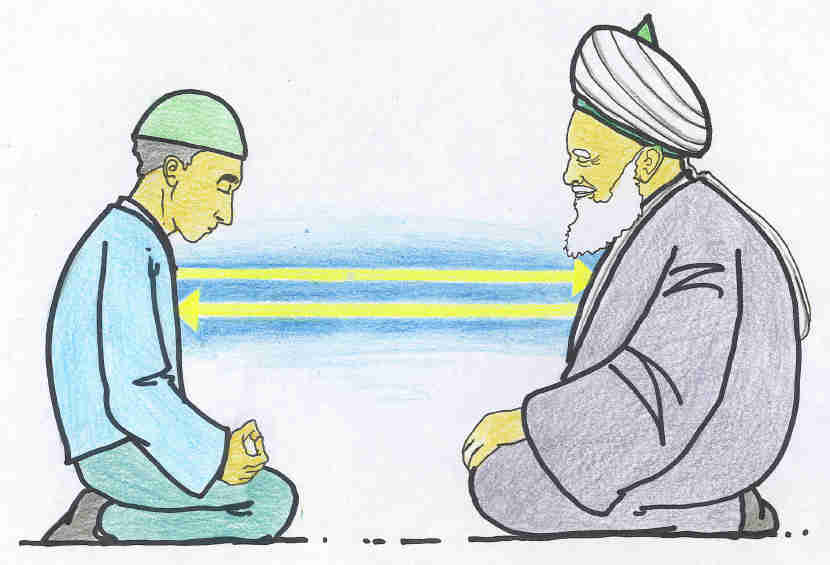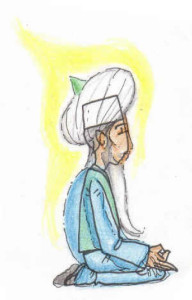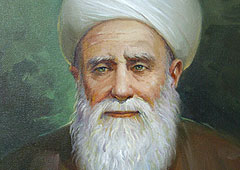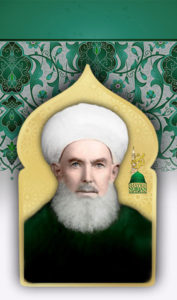
Schritt für Schritt Muraqabah/Tafakkur Prophetische Meditation
Original Article

Schritt für Schritt Muraqabah / Tafakkur Prophetische Meditation
Mit einem Murshid / Shaykh (Spiritueller Führer)
Aus den Realitäten von Mawlana (Q), wie es von Shaykh Nurjan Mirahmadi gelehrt wurde
Wesentlich für den Fortschritt der muriden in Richtung Enthüllung und Sieg über die Schleier der dunya ist die konsequente und tägliche Praxis der Muraqabah-Meditation. Denn ohne Zweifel ist man standardmäßig in die Illusion der dunya versunken und nur durch die Abgeschiedenheit von ihrem ständigen Angriff auf die Sinne kann man hoffen, seiner Tyrannei zu entkommen. Muraqabah ist dann das Eintauchen in die Realität und damit das Gegenteil der Existenz in der dunya, das Eintauchen in die Illusion.
 Das Ziel und der Zweck von muraqabah ist es, die ständige Präsenz in der Realität des Shaykh zu manifestieren. Je mehr man sich an diese lebenswichtige Praxis hält, desto mehr wird sich ihr Nutzen in seinem täglichen Leben bis zu dem Punkt manifestieren, an dem er in Gegenwart des Shaykh den Zustand der Vernichtung erreicht. Man muss gut wissen, dass der Shaykh die Brücke zwischen Illusion und Realität ist und nur zu diesem Zweck in dieser Welt bleibt. Der Shaykh ist somit ein einzigartiges Seil für jeden, der Freiheit sucht, denn nur er kann als Bindeglied zwischen einem noch in dieser Welt versunkenen und der göttlichen Gegenwart dienen. In der Gegenwart und Realität des Shaykh vernichtet zu werden, bedeutet in der Gegenwart, der Realität der Göttlichen Gegenwart vernichtet zu werden, denn genau wo er ist.
Das Ziel und der Zweck von muraqabah ist es, die ständige Präsenz in der Realität des Shaykh zu manifestieren. Je mehr man sich an diese lebenswichtige Praxis hält, desto mehr wird sich ihr Nutzen in seinem täglichen Leben bis zu dem Punkt manifestieren, an dem er in Gegenwart des Shaykh den Zustand der Vernichtung erreicht. Man muss gut wissen, dass der Shaykh die Brücke zwischen Illusion und Realität ist und nur zu diesem Zweck in dieser Welt bleibt. Der Shaykh ist somit ein einzigartiges Seil für jeden, der Freiheit sucht, denn nur er kann als Bindeglied zwischen einem noch in dieser Welt versunkenen und der göttlichen Gegenwart dienen. In der Gegenwart und Realität des Shaykh vernichtet zu werden, bedeutet in der Gegenwart, der Realität der Göttlichen Gegenwart vernichtet zu werden, denn genau wo er ist.
Anfänglich kann der murid in kurzen Intervallen von 5 bis 15 Minuten mit dem Üben von muraqabah beginnen und schrittweise auf längere Sitzungen hinarbeiten, die sich sogar über Stunden erstrecken. Der wichtige Punkt ist, dass man eine konsistente Praxis beibehält, um Nutzen zu erzielen. Es ist viel besser und klüger, sich täglich an eine kleine Menge zu halten, als in der eigenen Disziplin und Praxis sporadisch zu sein. Ein geringer Aufwand, der konsequent unternommen wird, führt bereits in kurzer Zeit zu enormen Fortschritten.
Die folgenden Schritte sind eine Richtlinie, um Muraqabah (spirituelle Verbindung) mit Mawlana Shaykh herzustellen:
- Machen Sie frisches wudu und beten Sie 2 raka.
- 3x shahada [Kalimatu shahada: Ashhadu an la ilaha illallah, wa ashhadu anna Muhammadan RasulAllah]
- 100-200x Istighfar [Astaghfirul lahal `Atheem wa atubu ilayh]
- 3x Sure Ikhlas [Qul hu Allah hu Ahad Allah hu Samad Lam yalid wal lam ulad wa lam lakon la hul kofuone ahad]
- Ihda, du’a für Shuyukh [Ihda ‘Allahumma balligh thawaba ma qara’nahu wa nura ma talawnahu hadiyatan wa asilatan minna ila ruhi Nabiyina Muhammad Shaykhina `abdullah ed-Daghistani, wa Sultan Awliya Mawlana Shaykh Nazim Haqqani wal Murshidina Mawlana Shaykh Hisham Kabbani war siddiqeenal Fatiha (lesen Sie fatiha)]
- Sure Fatiha – Mindestens 200x um Unterstützung und Anwesenheit von Mawlana Shaykh (Q) bitten: “Madad ya Sayyidi, Madadul-Haq Ya Mawlana Shaykh Nazim Haqaani“ Wiederholung von zikr
Als nächstes muss man sich vorstellen, in die Gegenwart des Shaykh einzutreten, denn in Wirklichkeit ist er immer in der Gegenwart des Shaykh, aber aufgrund der Unachtsamkeit sind wir uns dieser grundlegenden Tatsache nicht bewusst. An diesem Punkt ist es eine gute Praxis, Mawlana Shaykh (Q) salaams zu geben und ihtiram (Respekt) zu machen und danach vollständig in einer Adab-Position zu bleiben, vorzugsweise auf den Knien, bewusst und wach und verbunden. Man kann dann seiner Seele erlauben, sich mit dem Shaykh zu unterhalten, um so seine Beziehung zur Realität des Shaykh zu definieren, zu stärken und aufzubauen und dem zu folgen, was Mawlana Shaykh (Q) seinem Herzen offenbart.
Eine solche persönliche Praxis ist einzigartig und privat, und das Vorstehende ist als allgemeine Richtlinie gedacht. Es ist wichtig, dass jeder Einzelne seine persönliche Beziehung zum Shaykh entwickelt, wie es für ihn oder sie bestimmt ist.

Mureeds Lebenserhaltung
Stellen Sie sich vor, Ihr Shaykh wird auf Sie gekleidet. Sein Gesicht über Ihrem Gesicht Sein Bart über Ihrem Kinn, Sein Herz über Ihren Herzen.
Rezitieren Sie Madad Al Haqq 200 Mal.
 Naqshbandi Daily Awrad (Spirituelle Praktiken)
Naqshbandi Daily Awrad (Spirituelle Praktiken)
Awrad des Volkes der Entschlossenheit
- 3x shahada dreimal;
- 70x Astaghfirullah
- 1x Fatiha einmal mit der Absicht, an den Segnungen teilzunehmen, die mit ihm herabgesandt wurden, als es in Makka offenbart wurde.
- Bismillahir Rahmanir Rahim, Amana ar-Rasul (Sure 2, Verse 285-286), einmal. – Wer diesen ayat rezitiert, wird einen hohen Rang und eine großartige Position erreichen. Er wird die Sicherheit von al-Aman in dieser und der nächsten Welt erhalten.
- 7x Inshirah (Sure 94)
- 11x Ikhlas (Sure 112). Wer diese Sure rezitiert, muss die tajalli der beiden Namen der Herrlichkeit erhalten, al-Ahad (der Eine) und As-Samad (der Ewige). Wer es liest, muss einen Teil dieses tajalli bekommen.
- 1x Falaq (Sure 113)
- 1x Nas (Sure 114)
- Die Realität des Geheimnisses und der vollkommenen Vollständigkeit/Ganzheit (Kamal) von Allahs größtem Namen hängt mit diesen beiden Suren (Falaq & Nas) zusammen.
- 10x La ilaha illallah, das letzte Mal mit Muhammadun RasulAllah;
- 10x Salawat Ash-Sharifa
- Ihda, die dem Propheten (s) und den Shaykhs des Naqshbandi Tariqat die Belohnung der obigen Rezitation überreicht.
- Abschluss mit Sure Al Fatiha mit der Absicht, an den göttlichen Gnaden und Tajalli teilzuhaben, die herabgesandt wurden, als sie zum zweiten Mal in Medina offenbart wurden.
- Setzen Sie sich nun auf die Knie und meditieren Sie über die Verbindung (Rabitah) zu Ihrem Shaykh, von Ihrem Shaykh zu den Propheten und vom Propheten zur göttlichen Gegenwart und rezitieren Sie;
- 3x “Allahu Allahu Allahu Haqq“;
- 1500x min. Zikr des herrlichen Namens “Allah, Allah” 5000 Mal mit der Zunge, 5000 Mal mit dem Herzen.
- 300x – 1000-maliges Lob des Propheten durch Salawat und 2000-mal montags, donnerstags und freitags (2000-mal).
- 100x Sure Ikhlas oder 1/30 Juz-ein-dreißigstel des Korans (juz) oder stattdessen Ikhlas 100 Mal;
- 100x salawat Nabi oder ein Kapitel von Dala’il al-Khairat oder stattdessen 100-mal salawat.
Wer Surat al-Fatiha mit der Absicht Rezitiert Wird eine Hohe Position und einen Hohen Rang Erreichen
 GrandShaykh sagte: “Wenn jemand Fatiha liest, wird er diese Welt nicht verlassen, ohne die göttlichen Gunst zu erlangen, die hinter der Bedeutung des Fatiha verborgen sind und es ihm ermöglichen, sich Allah (AJ), dem Allmächtigen und Erhabenen zu unterwerfen. Der Segen, den Allah (AJ) mit der Fatiha herabgesandt hat, als er dem Propheten (s) offenbart wurde, wird niemals aufhören und für immer andauern, mit demjenigen, der die Fatiha rezitiert. Niemand kann wissen, wie viel Segen es gibt, außer Allah (AJ) und Seinen Gesandten (s). Wer surat al-Fatiha rezitiert, um an diesen tajallis teilzuhaben, wird eine hohe Position und einen hohen Rang erreichen. Und wer ohne diese Absicht rezitiert, bekommt nur allgemeine göttliche Gefälligkeiten. Diese Sure besitzt unzählige und grenzenlose Stationen (Maqamat) in den Augen Allahs, der mächtig und erhaben ist.
GrandShaykh sagte: “Wenn jemand Fatiha liest, wird er diese Welt nicht verlassen, ohne die göttlichen Gunst zu erlangen, die hinter der Bedeutung des Fatiha verborgen sind und es ihm ermöglichen, sich Allah (AJ), dem Allmächtigen und Erhabenen zu unterwerfen. Der Segen, den Allah (AJ) mit der Fatiha herabgesandt hat, als er dem Propheten (s) offenbart wurde, wird niemals aufhören und für immer andauern, mit demjenigen, der die Fatiha rezitiert. Niemand kann wissen, wie viel Segen es gibt, außer Allah (AJ) und Seinen Gesandten (s). Wer surat al-Fatiha rezitiert, um an diesen tajallis teilzuhaben, wird eine hohe Position und einen hohen Rang erreichen. Und wer ohne diese Absicht rezitiert, bekommt nur allgemeine göttliche Gefälligkeiten. Diese Sure besitzt unzählige und grenzenlose Stationen (Maqamat) in den Augen Allahs, der mächtig und erhaben ist.
Er wird in Gegenwart Allahs, des Allmächtigen und Erhabenen, in den Sicherheitskreis eintreten und alle Stationen des angesehensten Naqshbandi-Ordens erreichen. Er wird ein Erbe des Geheimnisses des Propheten und der Heiligen sein und das Stadium von Bayazid al-Bistami (Q), dem Imam des Ordens, erreichen, der sagte: “Ich bin die Wahrheit (al-Haqq).” Dies ist das großartige tajalli (Manifestation), das zu diesem ayat und auch zu anderen ayats gehört.
GrandShaykh Khalid al-Baghdadi (Q), einer der Imame dieses Ordens, erhielt die vision und das geheimnis dieses ayat, durch die Allah (AJ) ihn für seine Zeit zu etwas Besonderem machte.
 Sure Inshirah: Auf jedem Buchstaben und auf jedem ayat gibt es ein tajalli, das sich von dem auf jedem anderen unterscheidet. Wer ein ayat oder einen Brief des Korans rezitiert, wird die göttliche Gnade erlangen, die für dieses ayat oder diesen Brief besonders ist.
Sure Inshirah: Auf jedem Buchstaben und auf jedem ayat gibt es ein tajalli, das sich von dem auf jedem anderen unterscheidet. Wer ein ayat oder einen Brief des Korans rezitiert, wird die göttliche Gnade erlangen, die für dieses ayat oder diesen Brief besonders ist.
Wenn jemand diese Sure des Korans rezitiert, wird er diese göttlichen Gnaden, tajallis und Tugenden empfangen. Wer diese Tugenden erlangen will, muss diese täglich zusammen mit seinen Verpflichtungen bewahren. Dann wird er wahres Leben und ewiges Leben gewinnen.
 Sure Nas & Falaq: Da sie das Ende des Korans markieren, sind sie mit der Vollendung der göttlichen Gnaden und tajallis verbunden und verknüpft/vereinigt. Durch diese awrad wurden die Meister des angesehensten Naqshbandi-Ordens zu Ozeanen des Wissens und der Gnosis. (Kenntniss Spiritueller Geheimnisse). GrandShaykh Abdullah al-Fa’iz ad-Dagestani (Q) sagte: Sie haben jetzt den Anfang erreicht, an dem jeder Vers, Buchstabe und jede Sure des Korans seine eigenen speziellen tajalli hat, die keinem anderen ähneln. Aus diesem Grund sagte der Gesandte Allahs (s): “Ich habe drei Dinge bei meiner Ummah gelassen, den Tod, der ihnen Angst macht, wahre Träume, die ihnen gute Nachrichten geben, und den Koran, der sie anspricht.” Durch den Koran wird Allah (AJ) in der letzten Zeit die Tore der göttlichen Gnade öffnen, wie es in der Zeit des Heiligen Propheten (s) und der Gefährten, in der Zeit der khalifas und in der Zeit der Heiligen.
Sure Nas & Falaq: Da sie das Ende des Korans markieren, sind sie mit der Vollendung der göttlichen Gnaden und tajallis verbunden und verknüpft/vereinigt. Durch diese awrad wurden die Meister des angesehensten Naqshbandi-Ordens zu Ozeanen des Wissens und der Gnosis. (Kenntniss Spiritueller Geheimnisse). GrandShaykh Abdullah al-Fa’iz ad-Dagestani (Q) sagte: Sie haben jetzt den Anfang erreicht, an dem jeder Vers, Buchstabe und jede Sure des Korans seine eigenen speziellen tajalli hat, die keinem anderen ähneln. Aus diesem Grund sagte der Gesandte Allahs (s): “Ich habe drei Dinge bei meiner Ummah gelassen, den Tod, der ihnen Angst macht, wahre Träume, die ihnen gute Nachrichten geben, und den Koran, der sie anspricht.” Durch den Koran wird Allah (AJ) in der letzten Zeit die Tore der göttlichen Gnade öffnen, wie es in der Zeit des Heiligen Propheten (s) und der Gefährten, in der Zeit der khalifas und in der Zeit der Heiligen.
Wir dürfen keinen Mangel in unseren Zikr eindringen lassen
 Diese Stationen und fortlaufenden göttlichen Gnaden sind eng miteinander verbunden und können nicht getrennt werden. Daher führt jeder Mangel an Awrad automatisch zu einem Mangel an den herabgesandten göttlichen Gnaden. Wenn wir beispielsweise unsere Hände waschen möchten, können wir vor dem Wasserhahn warten, bis Wasser austritt. Wenn die Rohre nicht richtig angeschlossen sind, so dass das Wasser vor Erreichen des Wasserhahns entweicht, fließt das Wasser nicht aus, egal wie lange wir warten. Wir dürfen also keinen Mangel in unseren zikr eindringen lassen, bis wir alle Tajallis und göttlichen Gnaden erhalten haben.
Diese Stationen und fortlaufenden göttlichen Gnaden sind eng miteinander verbunden und können nicht getrennt werden. Daher führt jeder Mangel an Awrad automatisch zu einem Mangel an den herabgesandten göttlichen Gnaden. Wenn wir beispielsweise unsere Hände waschen möchten, können wir vor dem Wasserhahn warten, bis Wasser austritt. Wenn die Rohre nicht richtig angeschlossen sind, so dass das Wasser vor Erreichen des Wasserhahns entweicht, fließt das Wasser nicht aus, egal wie lange wir warten. Wir dürfen also keinen Mangel in unseren zikr eindringen lassen, bis wir alle Tajallis und göttlichen Gnaden erhalten haben.
Diese Awrad müssen einmal alle 24 Stunden durchgeführt werden
 Diese awrad für die Anhänger müssen zusammen mit allen anderen Verpflichtungen gemäß der Scharia des Propheten (s) einmal alle 24 Stunden durchgeführt werden. Alles, was der Prophet (s) brachte, wurde in diesen awrad gegründet. Auf diese Weise erreicht der Sklave den Schlüssel der Nähe zu Allah (AJ), der mächtig und erhaben ist. Auf diese Weise erreichten die Propheten, Boten und Heiligen ihren Schöpfer, und auf diese Weise erreichen wir alle diese Stationen des angesehensten Tariqat.
Diese awrad für die Anhänger müssen zusammen mit allen anderen Verpflichtungen gemäß der Scharia des Propheten (s) einmal alle 24 Stunden durchgeführt werden. Alles, was der Prophet (s) brachte, wurde in diesen awrad gegründet. Auf diese Weise erreicht der Sklave den Schlüssel der Nähe zu Allah (AJ), der mächtig und erhaben ist. Auf diese Weise erreichten die Propheten, Boten und Heiligen ihren Schöpfer, und auf diese Weise erreichen wir alle diese Stationen des angesehensten Tariqat.
Die Meister des angesehensten Naqshbandi-Ordens sagen, dass jeder, der behauptet, er sei einem der 40 Orden oder dem angesehensten Naqshbandi-Orden angeschlossen, aber dennoch nicht einmal in seinem Leben in die Abgeschiedenheit (khalwat) eingetreten ist, dann eine solche Person sollte sich schämen, sich mit dem Volk des Pfades zu verbinden.
Mit diesem Awrad haben wir den Grundstein für die höheren Stationen gelegt
 In unserer Zeit sagte Grand Shaykh Abdullah ad-Dagestani (Q): “Welches Volk der letzten Zeit (akhir az-zaman) möchte einen hohen Rang und einen erhabenen Zustand erreichen und das bekommen, was ein Murid normalerweise durch Abgeschiedenheit bekommt (Khalwat) und spirituelle Übungen, dann muss er diese awrad (zikr) kontinuierlich durchführen. Mit diesem awrad haben wir den Grundstein für die höheren Stationen gelegt, die auf diesem Fundament errichtet werden. Der murid sollte wissen, dass er nicht von dieser Welt getrennt werden soll, wenn er aufgrund seiner mangelnden Anstrengung keine erhabene Station und keinen hohen Grad in dieser Welt erreicht, sondern dass die Shaykhs ihn dazu bringen, sie zu erreichen und für ihn zu offenbaren seine Station, entweder zu Lebzeiten oder zum Zeitpunkt der sieben letzten Atemzüge während der Todesqualen.“
In unserer Zeit sagte Grand Shaykh Abdullah ad-Dagestani (Q): “Welches Volk der letzten Zeit (akhir az-zaman) möchte einen hohen Rang und einen erhabenen Zustand erreichen und das bekommen, was ein Murid normalerweise durch Abgeschiedenheit bekommt (Khalwat) und spirituelle Übungen, dann muss er diese awrad (zikr) kontinuierlich durchführen. Mit diesem awrad haben wir den Grundstein für die höheren Stationen gelegt, die auf diesem Fundament errichtet werden. Der murid sollte wissen, dass er nicht von dieser Welt getrennt werden soll, wenn er aufgrund seiner mangelnden Anstrengung keine erhabene Station und keinen hohen Grad in dieser Welt erreicht, sondern dass die Shaykhs ihn dazu bringen, sie zu erreichen und für ihn zu offenbaren seine Station, entweder zu Lebzeiten oder zum Zeitpunkt der sieben letzten Atemzüge während der Todesqualen.“
Wir müssen über jede Aktion nachdenken, die wir durchführen werden
 Wenn jemand diese awrad (zikr) ausführt und dann eine Handlung ausführt, die verboten ist, wird er wie derjenige sein, der sein Haus auf einem Klippenrand/seite vom Felsen baut und dann stürzt sein Haus vom rand des Felsen/der Klippe hinunter. Deshalb sollen wir uns unserer Handlungen immer bewusst sein und sie messen, um festzustellen, ob sie halal oder haram sind, ob Allah (AJ) auf unsere Handlungen wütend sein wird oder nicht. Und wir müssen über jede Aktion nachdenken, die wir im Begriff sind, so viel zu tun, dass wir letztendlich nichts tun, was unser Fundament schwächen könnte. Deshalb müssen wir vor jeder Handlung nachdenken. Wie der / die Prophet (s) in seinem Hadith sagte: “Eine Stunde Kontemplation ist besser als siebzig Jahre Anbetung. “Wir sollten unsere Handlungen auf die vollkommen korrekte Weise ausführen, das heißt, ohne dass irgendwelche Haram-Taten eingreifen.” ohne dass irgendwelche haram-Taten eingreifen.
Wenn jemand diese awrad (zikr) ausführt und dann eine Handlung ausführt, die verboten ist, wird er wie derjenige sein, der sein Haus auf einem Klippenrand/seite vom Felsen baut und dann stürzt sein Haus vom rand des Felsen/der Klippe hinunter. Deshalb sollen wir uns unserer Handlungen immer bewusst sein und sie messen, um festzustellen, ob sie halal oder haram sind, ob Allah (AJ) auf unsere Handlungen wütend sein wird oder nicht. Und wir müssen über jede Aktion nachdenken, die wir im Begriff sind, so viel zu tun, dass wir letztendlich nichts tun, was unser Fundament schwächen könnte. Deshalb müssen wir vor jeder Handlung nachdenken. Wie der / die Prophet (s) in seinem Hadith sagte: “Eine Stunde Kontemplation ist besser als siebzig Jahre Anbetung. “Wir sollten unsere Handlungen auf die vollkommen korrekte Weise ausführen, das heißt, ohne dass irgendwelche Haram-Taten eingreifen.” ohne dass irgendwelche haram-Taten eingreifen.
Allah (AJ) hat den Tag in drei Teile geteilt
 “Auf dieser Grundlage hat Allah den Tag in drei Teile unterteilt: acht Stunden für den Gottesdienst, acht Stunden für den Lebensunterhalt und acht Stunden für den Schlaf. Jeder, der diese Aufteilung der Energien nicht akzeptiert und nicht befolgt, wird den Hadith veranschaulichen: “Wer unberechenbar ist, wird im Höllenfeuer unberechenbar sein.“ Wer nach seinem eigenen Willen und seiner Argumentation geht, macht keine Fortschritte und wer erhabene Stationen erhalten möchte Ebenen und Stufen, die frühere Generationen durch Exerzitien verdeint haben und andere spirituelle Übungen erreicht haben, müssen sich im Laufe des Tages an Allah erinnern.
“Auf dieser Grundlage hat Allah den Tag in drei Teile unterteilt: acht Stunden für den Gottesdienst, acht Stunden für den Lebensunterhalt und acht Stunden für den Schlaf. Jeder, der diese Aufteilung der Energien nicht akzeptiert und nicht befolgt, wird den Hadith veranschaulichen: “Wer unberechenbar ist, wird im Höllenfeuer unberechenbar sein.“ Wer nach seinem eigenen Willen und seiner Argumentation geht, macht keine Fortschritte und wer erhabene Stationen erhalten möchte Ebenen und Stufen, die frühere Generationen durch Exerzitien verdeint haben und andere spirituelle Übungen erreicht haben, müssen sich im Laufe des Tages an Allah erinnern.
GrandShaykh fuhr fort: “Wer das awrad (zikr) regelmäßig praktiziert, wird das Wasser des Wahren Lebens erreichen und damit die Waschung durchführen. Er wird darin baden und es trinken und damit sein Ziel erreichen. Es gibt eine solche Person, die behauptet, seit dreißig Jahren im Orden zu sein und noch nichts gesehen und nichts erreicht zu haben. Die Antwort auf diese Person besteht darin, ihre Handlungen in den letzten Jahren zu suchen und zu betrachten. Wie viele mangelhafte Aktionen hat er durchgeführt? Wenn Sie den Mangel kennen, sollten Sie ihn schnell vermeiden, dann werden Sie Allah erreichen, der mächtig und erhaben ist. Wenn der Murid das aufgibt, was die Shaykhs ihm von der täglichen Pflicht (wazifa) gesagt haben, wird er absolut nicht in der Lage sein, weitere Fortschritte zu erzielen, und er wird keinen Zustand erreichen können, den er zuvor erreicht hatte. Kein prophet hat jemals das prophetentum erlangt, noch hat kein Heiliger jemals die Heiligkeit erlangt, und kein Gläubiger hat jemals die Stufe des Glaubens erreicht, ohne seine Zeit für seinen täglichen zikr zu nutzen.“
Updated: January 5, 2020
Zum Thema passende Artikel:
- Naqshbandi Daily Awrad (Practice)
- Step By Step Illustration on Islamic Meditation / Muraqaba / Tafakkur
- Connecting to Sheikh (Guide)
- Body, Mind, and Soul Meditation
- Healing Power of Islamic Meditation / Muraqaba
Please Donate and support us to spread these heavenly knowledges.
Copyright © 2020 Naqshbandi Islamic Center of Vancouver, All Rights Reserved.














